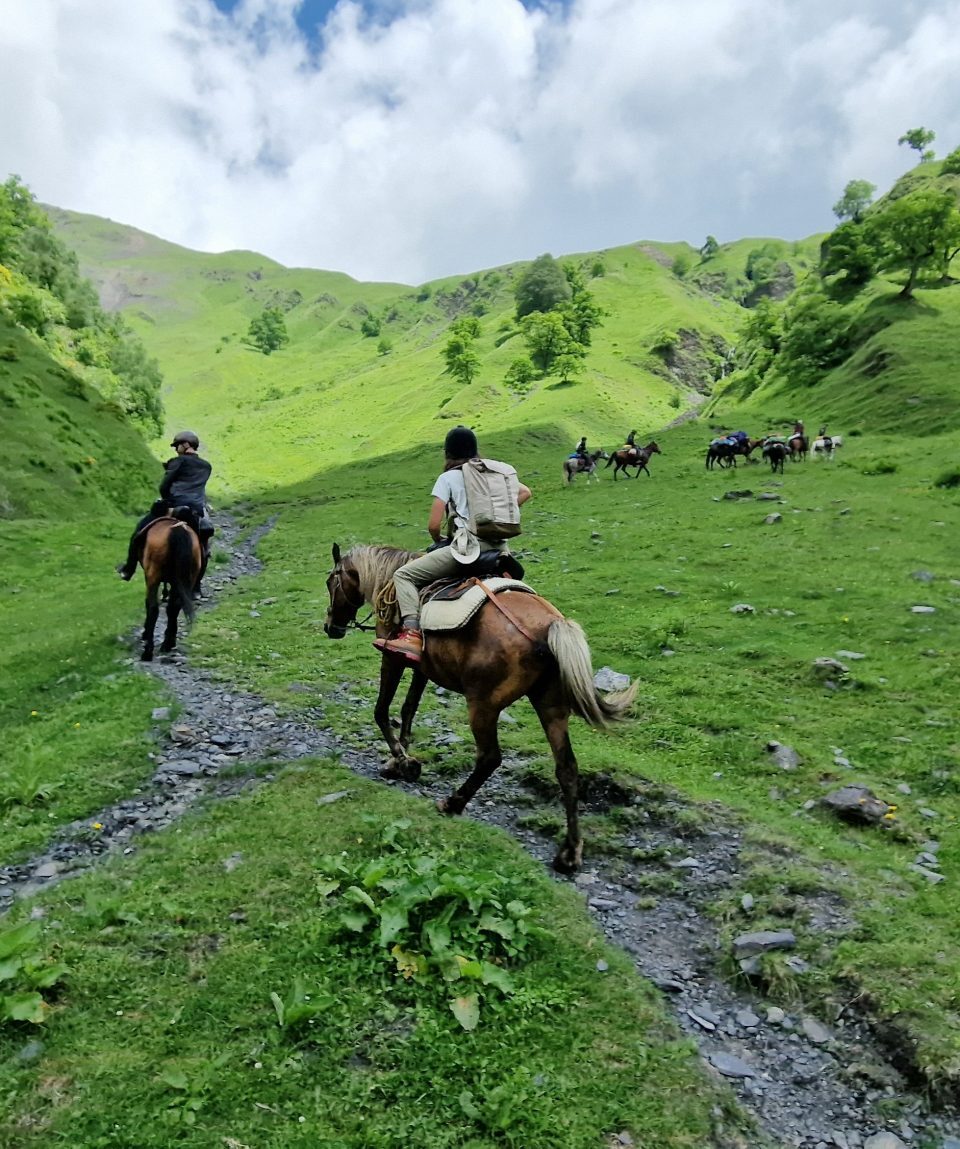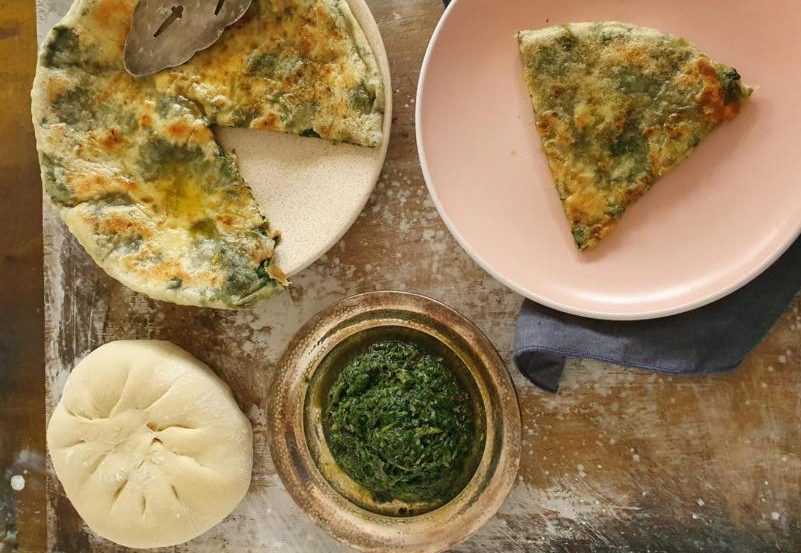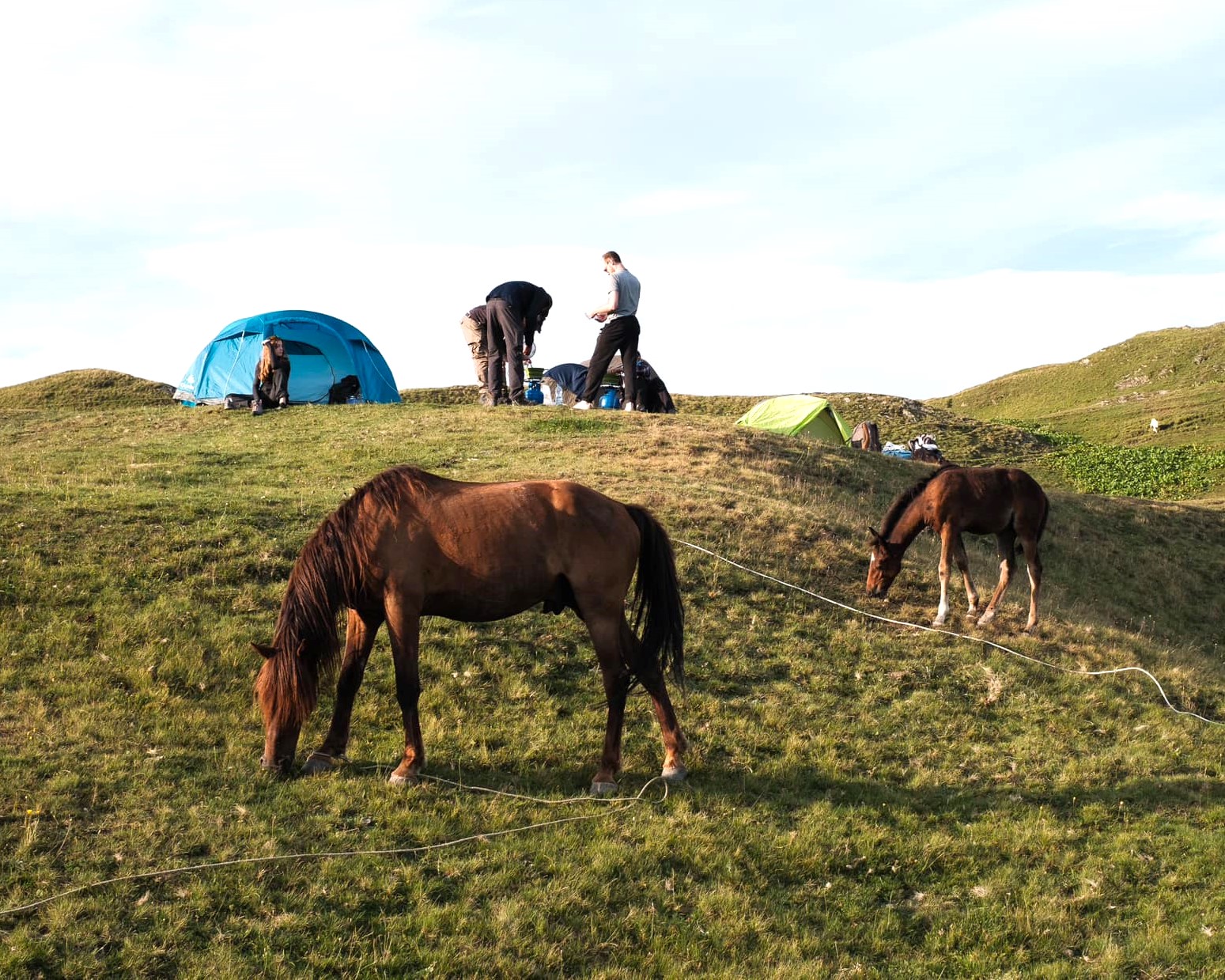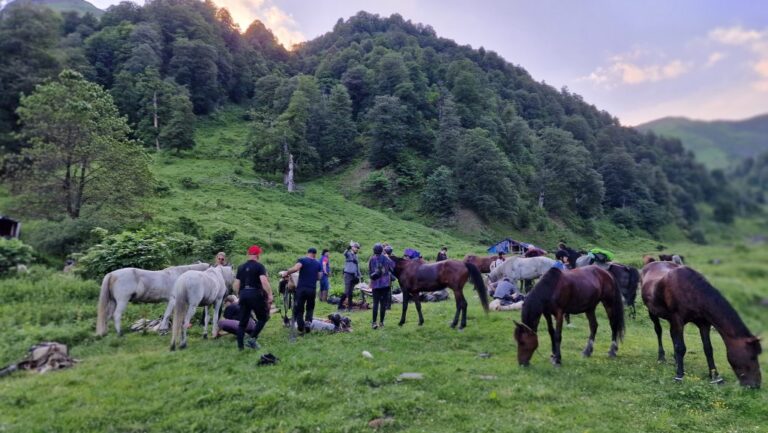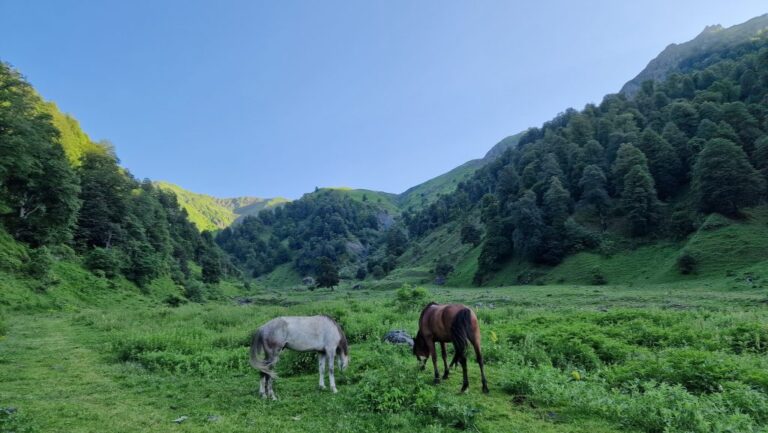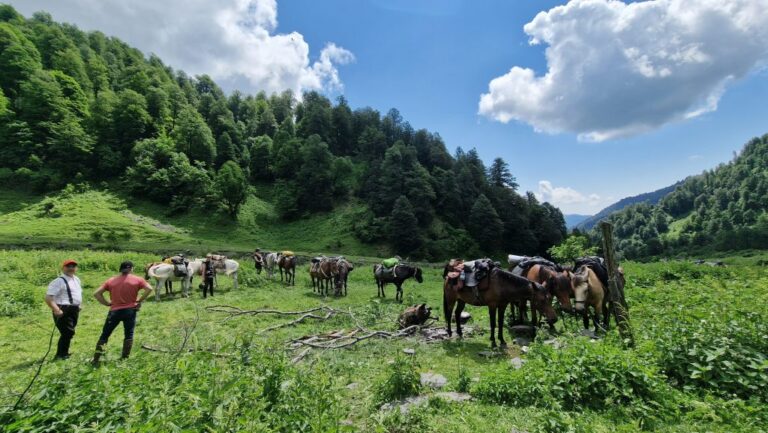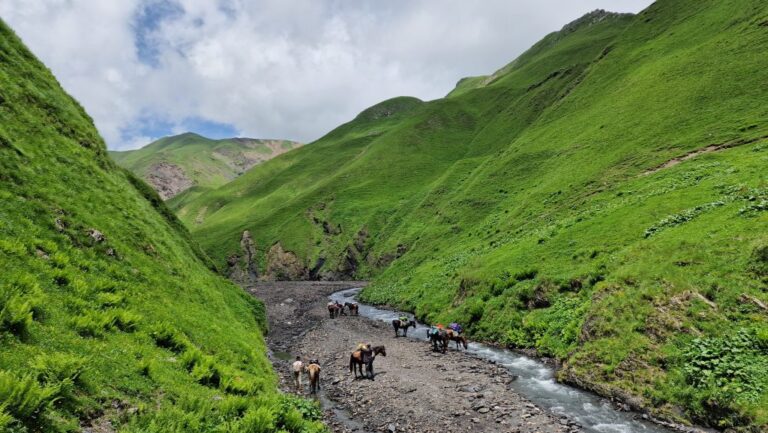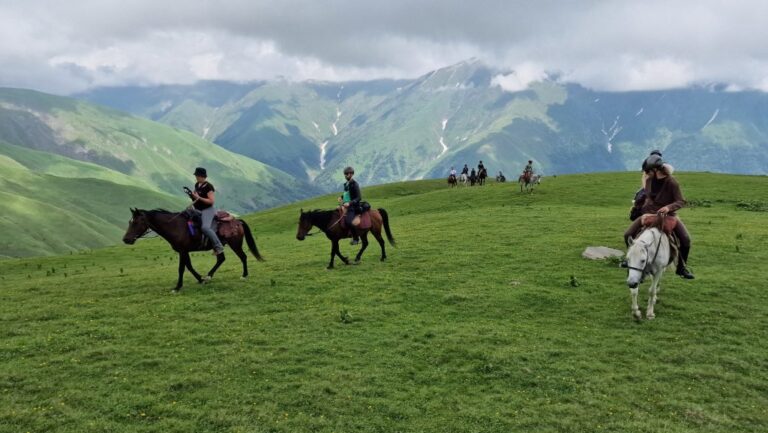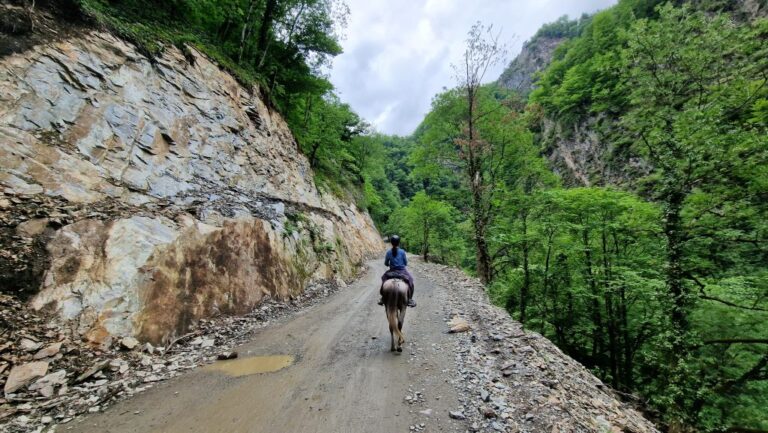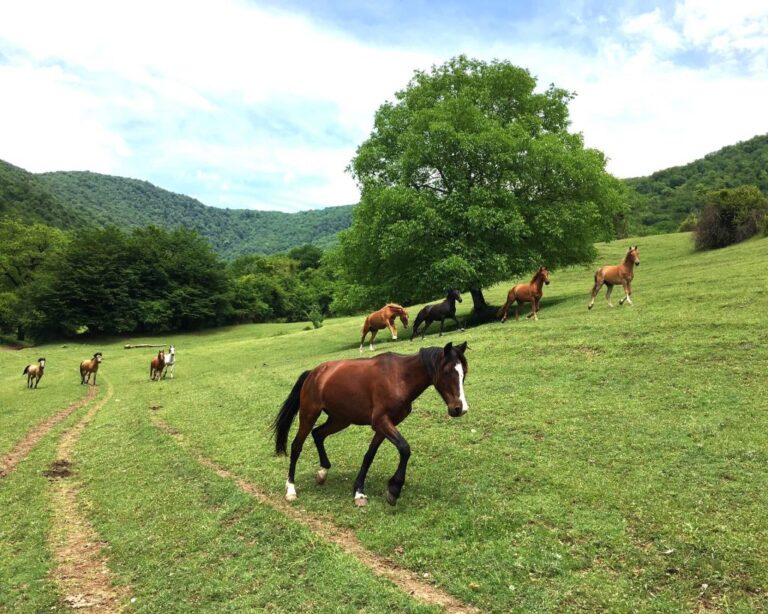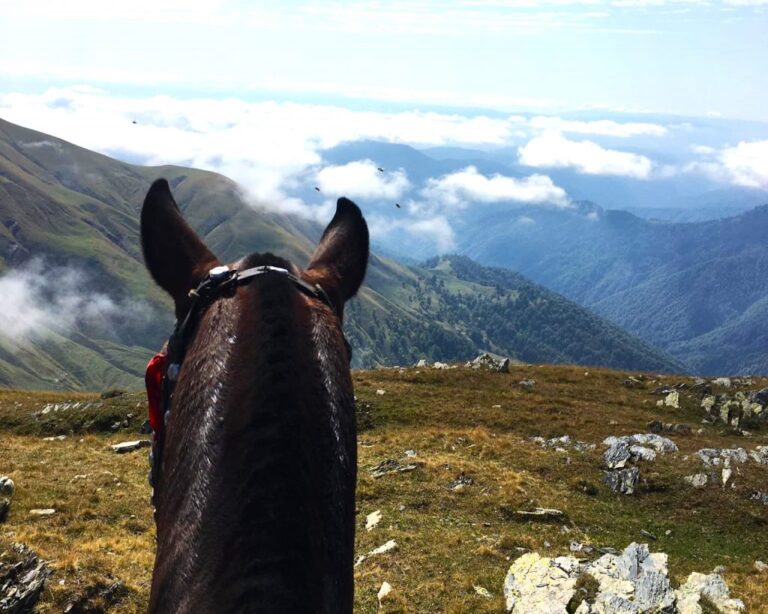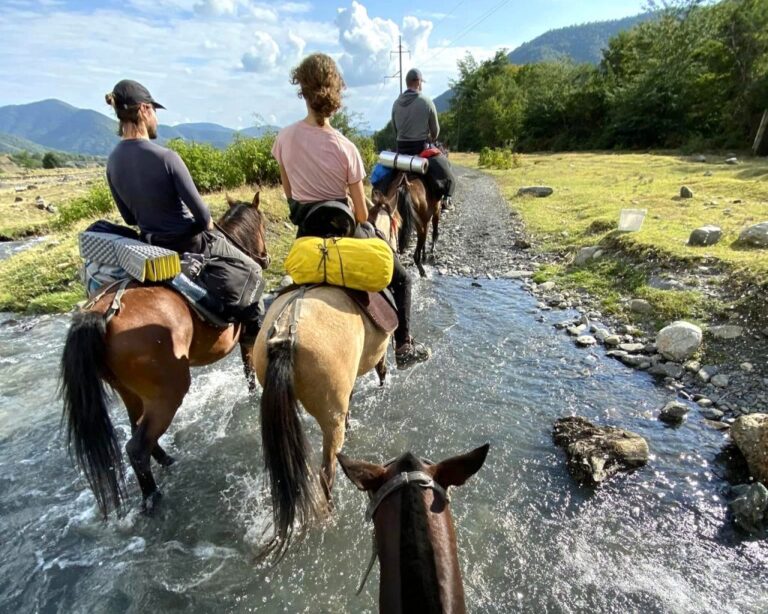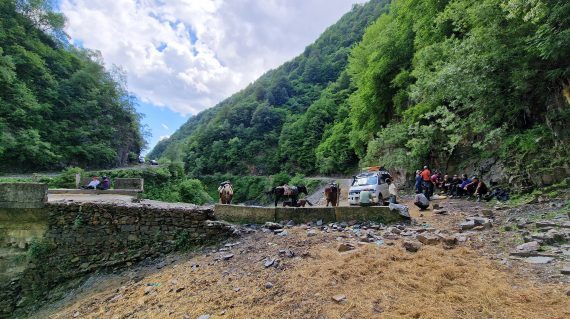
Two Faces of the Caucasus
Georgia
We set out to Georgia to traverse both lowland Kakheti and high mountain parts of the Caucasus on horseback. We will spend a week in a saddle visiting the Pankisi Gorge and its mountainous surrounding, ride the lowlands at the foothills of the Caucasus and cross the famous Abano Pass to reach wild, high mountain region of Tusheti. This ride is also an expedition through Georgia’s ethnic heritage: we will be hosted by both the Kists – Georgian Chechens, as well as the Tushetians – the highlanders of Tusheti. We will start in the Pankisi Gorge and venture out to the higher part of the mountains to look at the Caucasus from the borderland between Pankisi and Tusheti. Then we’ll return to the lowlands and head into the mountains again. Following the famous road to Tusheti we’ll cross the spectacular Abano Pass and reach Omalo, where we will ride out once again to marvel at the Greater Caucasus from a different perspective.
-
Days overall10 daysDays in saddle7
-
Group size10Available
-
Standardhighlanders' hospitality: under roofs and campingLuggageno limit kgFoodlocal cuisine, vegetarian available although limited
-
Skillswalk, trot, canter, good physical condition
We embark on an unusual journey to view the Caucasus from different perspectives. We will pass through several regions of Georgian Kakheti, both mountainous and lowland – at the foot of the Caucasus. We will start the trip in the Pankisi Gorge, an area at the foot of the Caucasus inhabited by the Kists – Georgian Chechens. The Kists moved here in the early 19th century and, along with their Georgian citizenships, adopted local names and settled for good in their new homeland. They are Muslims who practice Sufism, with additional animistic beliefs typical of the region. At present, their overall population is estimated at about 15,000 people, of whom about 8,000 live in Pankisi.
After warm-up rides around the villages of Jokolo and Duisi we will ride to the outskirts of Pankisi. We will reach Qochadala, a valley surrounded by mountains and belonging to the Kists of Jokolo. Until a few years ago a simple base was located at that spot. Shepherds grazed their animals and from there they led thir flocks to pastures located high in the mountains. Today the shepherding spot is abandoned and became our base for exploring the area. We will stay in Qochadala for two nights, camping in tents, setting off for a day of riding in the area to make a loop around and look at the Caucasus from this side.
The next day we will return to Jokolo, where – after two days of camping – we will enjoy the charms of civilization, with hot shower on top of the list. In the late afternoon we’ll saddle up and ride out of Pankisi. After an evening ride we will arrive in the village of Alvani, the lowland home of the highlanders of Tusheti, where we’ll stay overnight.
During the next two days we will ride the famous road to Tusheti, through the spectacular Abano Pass located at 2,826 meters above sea, to reach the village of Omalo. The first day is quite long, as we have to reach the top of the pass and cross it to the national park rangers’ post, where we set up camp. It’s a big chunk of the road – a bit over 50 kilometers to ride. The second day’s ride is shorter and in the afternoon we will reach Upper Omalo, our main base in Tusheti. There we will be welcomed by Tusheti highlanders, our great, long-time friends.
The last day of the tour is a ride in Tusheti. Depending on the condition of the group after the previous days 🙂 we will choose a longer or shorter trail that day. We have plenty of options, each offering an extraordinary day in the saddle and spectacular views of the High Caucasus.
The composition of the group’s guides and hosts during this tour is quite unusual. From beginning to end, the group is cared for and guided on horseback by the Kists of Pankisi, and from the moment we leave the Pankisi Gorge until the end of our horseback adventure you will be additionally assisted by highlanders from Tusheti. During the tour we will be hosted by both the Kists and the Tushetians in ther guesthouses and homes. We camp for three nights, two in Pankisi and one on or just past the Abano Pass.
This tour is quite a ride, requiring good riding skills and decent physical condition. The weather will vary, ranging from very hot temperatures in the lowlands to chilly ones in high mountain parts. Thunderstorms and heavy rain might also occur in the mountains, in severe cases requiring riders to dismount and lead their horses in challenging mountain conditions, heavy rain, strong wind and cold.
- 2 nights at a hotel in Tbilisi
- 4 nights at guesthouses in Jokolo, Alvani and Omalo
- 3 nights tenting: 2 in Pankisi and 1 on Abano Pass
- Breakfasts in Tbilisi
- All meals in Pankisi and Tusheti (breakfast, lunch “to go” during the stopover, dinner)
- All food supplies for camping nights from which the group prepares meals together
- Transfers to and from Tbilisi airport (on first and last days of the tour)
- Transport from Tbilisi to Pankisi and from Tusheti to Tbilisi
- Horsemen and guides during the entire ride in Tusheti
- English-speaking pilot/guide during the entire tour
- Horse with full tack and equipment
- Pack horses
- Luggage/assisting car from Alvani to Omalo
- Tourist insurance covering high-risk sports
- Flight tickets to and from Georgia
- In Tbilisi: two dinners – on the first and last nights
- Minor personal expenses (souvenirs, additional snacks, admission tickets, etc.)
- Optional: single room supplement (where available)
- Day 1 Welcome to Georgia
- Day 2 Reconnaissance in Pankisi
- Day 3 Waterfall and shepherds' base
- Day 4 Shepherd's Loop
- Day 5 Evening in the lowlands
- Day 6 Abano Pass
- Day 7 Omalo
- Day 8 Panorama of Tusheti
- Day 9 Back to Tbilisi
- Day 10 Farewell to Georgia

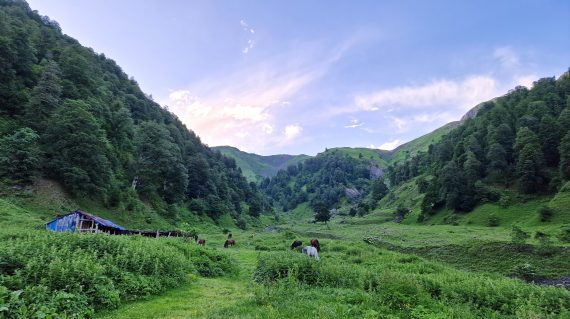
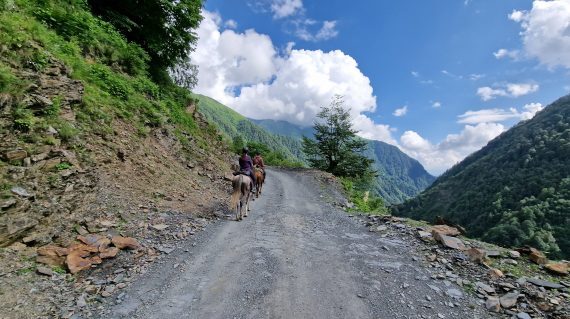
In Tbilisi we spend two night in a hotel of European standard. In Pankisi our main base is a guesthouse in the village of Jokolo. There we have access to a regular bathroom, showers and electricity. In Jokolo and Alvani we don’t need sleeping bags or sleeping mats, we stay under a roofs, in beds, with clean bedding. During the two days at the former shepherd base and during the Abano Pass crossing, we spend the night in tents and sleeping bags, prepare meals together and take care of our horses. During these three days we have no access to a bathroom: two of them are spent in the almost deserted mountains, and one is spent at or just after crossing the pass. There, the source of water for cooking and washing ourselves will be mountain streams. In Tusheti we spend the night again under a roof, in beds, with access to bathrooms and electricity.
In Tbilisi we eat breakfasts at the hotel (on the second and penultimate day). The other two meals in Tbilisi, i.e. dinner on the first and penultimate day, is to be purchased on our own (two dinners together with a bill to share). In Jokolo, Alvani and Omalo all meals are provided – breakfast and dinner in gueshouses, lunches to-go are taken packed and eaten on breaks. During the three days of camping we prepare our meals on campfires and portable burners together, from supplies carried by our pack horses.
Meals in Pankisi and Tusheti are traditional dishes, typical of Georgian cuisine: mainly beef and mutton, vegetables and local cheese in different forms. Drinks include – in addition to crystal clear water – herbal teas, wine and chacha. In Tbilisi restaurants serving dishes from around the world are available, athough we choose those serving typical Georgian dishes.
Equipment
We use typical Caucasian saddles. They are quite different from the English and Western-style saddles and very comfortable for both horses and riders, especially for high mountain riding. Steel saddle bows are set on wooden benches. This construction is covered with a moderately soft “pillow” made of leather. The pillow is kept in its place by a strap, usually made of leather, which serves as a girth part at the same time. Tail docks are common.
Stirrup leathers in Georgia are relatively short – Georgians practice a distinctive seat: legs in the front, knees high. Stirrups are quite simple and wide, allowing trekking shoes to fit inside well. Bridles are also simple, made the usual way. We use bits.
Caucasian / Georgian moutain saddles often raise interest, as they are different than classical-English or Western-style ones. Fairly unknown in the West these saddles are very comfortable for long and steep rides. Pommels and cantles are quite high to stabilize riders in mountainous terrain and the pillow seat absorbs bumps very well. This non-standard construction is also quite practical when it comes to attaching larger quantities of luggage.
Riding helmets are available on the spot upon earlier request.
What should you take with you
The tour route takes us through both inhabited areas, where we spend nights in comfortable guesthouses, as well as lead to wild, secluded places where we spend nights tenting. During the stay in the old shepherding base we are not assisted by a car, so all the things we need for two days should be packed in a waterproof backpack / drybag that can be strapped to the saddle. In the second part of the tour, when crossing the Abano Pass to Tusheti for two days, all luggage will be transported by car.
You should take a sleeping bag with you, tents and sleeping mats are provided on site.
Before the tour, one month in advance, we will send out a detailed info email with list of things to pack, along with our recommendations and comments.
Basic list:
- passport
- cash, USD or EUR recommended
- electronic devices, e.g. camera, powerbank
- a canteen or other water containers (it might be an empty plastic bottle)
- a handy, small backpack or waist/hip bag (for documents, phone, small personal items, etc.)
- waterproof bag(s) for the camping/tenting days (sailing or kayak type ones are great)
- flashlight; head flashlights are quite handy
- sunscreen
- personal riding clothes and gear
- trekking shoes, waterproof ones advised
- raincoat / waterproof jacket
- flip-flops for showering
- sleeping bag
| Date | Trip Status | Price | Spots | |
|---|---|---|---|---|
23 July 2025 - 1 August 2025
|
Available, English-speaking guide/pilot |
1190 € |
5 |
|
3 September 2025 - 12 September 2025
|
Full group, English-speaking guide/pilot |
1190 € |
0 |
